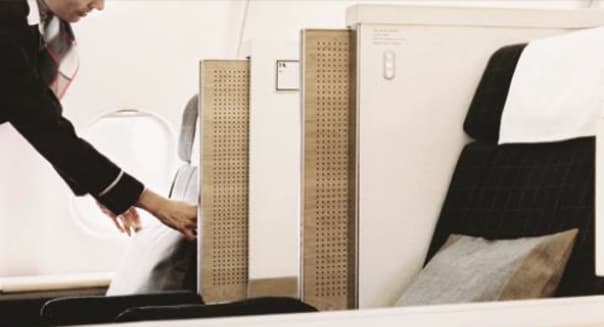 Swiss.com Relief is on the way for travelers with food intolerances and allergies. Beginning in May, Swiss International Air Lines is instituting an "allergy-friendly" policy. "We have seen a steady increase over the past few years in our customers' need for an air travel environment that pays due regard to any allergic conditions," said Frank Maier, Swiss's head of product and services. "So we've been working with [the European Centre for Allergy Research Foundation] to provide a concrete response to these demands to make everyone's air travel experience as pleasant and problem-free as possible." The changes -- which make it the world's first airline to get a seal of approval from the foundation -- address environmental allergens and food intolerances, but not food allergies. Gentle Soaps Added, Air Fresheners Removed Changes will include making available gluten- and lactose-free snacks and drinks in flight and "allergy-friendly" foods in Swiss lounges in Switzerland. Passengers with food intolerances will be able to order special meals in all seating classes during long flights, but only in business class within Europe. Requests for special meals must be made at least 24 hours in advance of the scheduled departure. In addition, changes will be made to the cabin environment, such as air filtering, gentle soaps in the lavatories and pillows stuffed with synthetic materials rather than down as an option in first and business classes. Further, the cabins will no longer have fresh flowers or air fresheners. Cabin crew members are trained to respond to allergic emergencies. Clifford Bassett, an allergist and fellow of the American College of Allergy, Asthma and Immunology, applauds the airline's efforts in addressing the growing population of individuals with food intolerances as well as those with environmental allergies and asthma. He notes the airline is not yet addressing the needs of the up to 5 percent of adults have food allergies. These passengers need to make an action plan with their allergist and travel with foods that are safe for them to eat, as well as two to four epinephrine auto-injectors. Passengers with airborne food allergies should request a barrier of 10 to 15 rows in front and behind their seat to reduce exposure, although ideally there would be no food allergens, he says.
Swiss.com Relief is on the way for travelers with food intolerances and allergies. Beginning in May, Swiss International Air Lines is instituting an "allergy-friendly" policy. "We have seen a steady increase over the past few years in our customers' need for an air travel environment that pays due regard to any allergic conditions," said Frank Maier, Swiss's head of product and services. "So we've been working with [the European Centre for Allergy Research Foundation] to provide a concrete response to these demands to make everyone's air travel experience as pleasant and problem-free as possible." The changes -- which make it the world's first airline to get a seal of approval from the foundation -- address environmental allergens and food intolerances, but not food allergies. Gentle Soaps Added, Air Fresheners Removed Changes will include making available gluten- and lactose-free snacks and drinks in flight and "allergy-friendly" foods in Swiss lounges in Switzerland. Passengers with food intolerances will be able to order special meals in all seating classes during long flights, but only in business class within Europe. Requests for special meals must be made at least 24 hours in advance of the scheduled departure. In addition, changes will be made to the cabin environment, such as air filtering, gentle soaps in the lavatories and pillows stuffed with synthetic materials rather than down as an option in first and business classes. Further, the cabins will no longer have fresh flowers or air fresheners. Cabin crew members are trained to respond to allergic emergencies. Clifford Bassett, an allergist and fellow of the American College of Allergy, Asthma and Immunology, applauds the airline's efforts in addressing the growing population of individuals with food intolerances as well as those with environmental allergies and asthma. He notes the airline is not yet addressing the needs of the up to 5 percent of adults have food allergies. These passengers need to make an action plan with their allergist and travel with foods that are safe for them to eat, as well as two to four epinephrine auto-injectors. Passengers with airborne food allergies should request a barrier of 10 to 15 rows in front and behind their seat to reduce exposure, although ideally there would be no food allergens, he says.
Monday, May 19, 2014
Fly the 'Allergy-Friendly' Skies: Airline Aims to Ground Allergens
Subscribe to:
Post Comments (Atom)
No comments:
Post a Comment